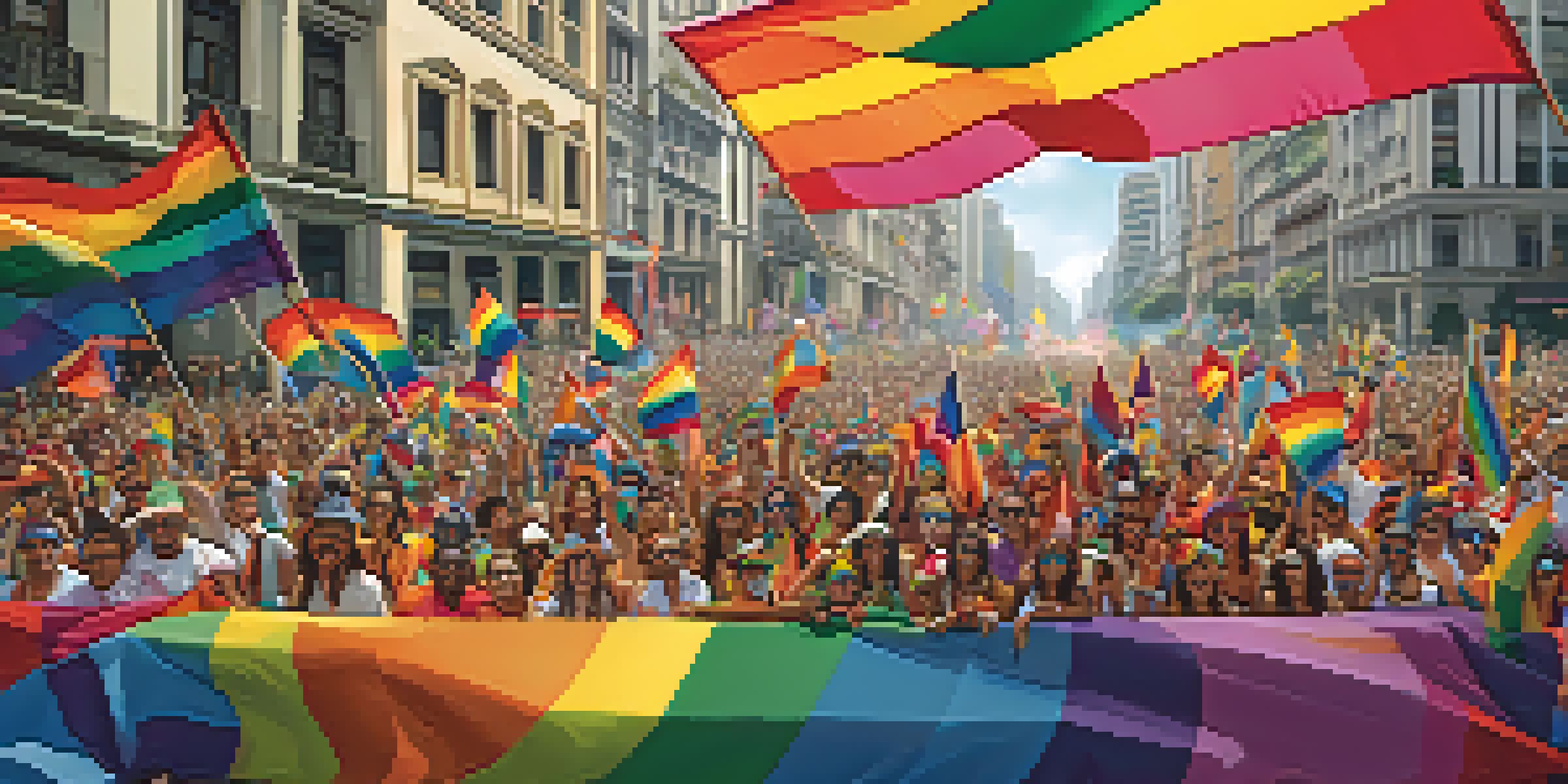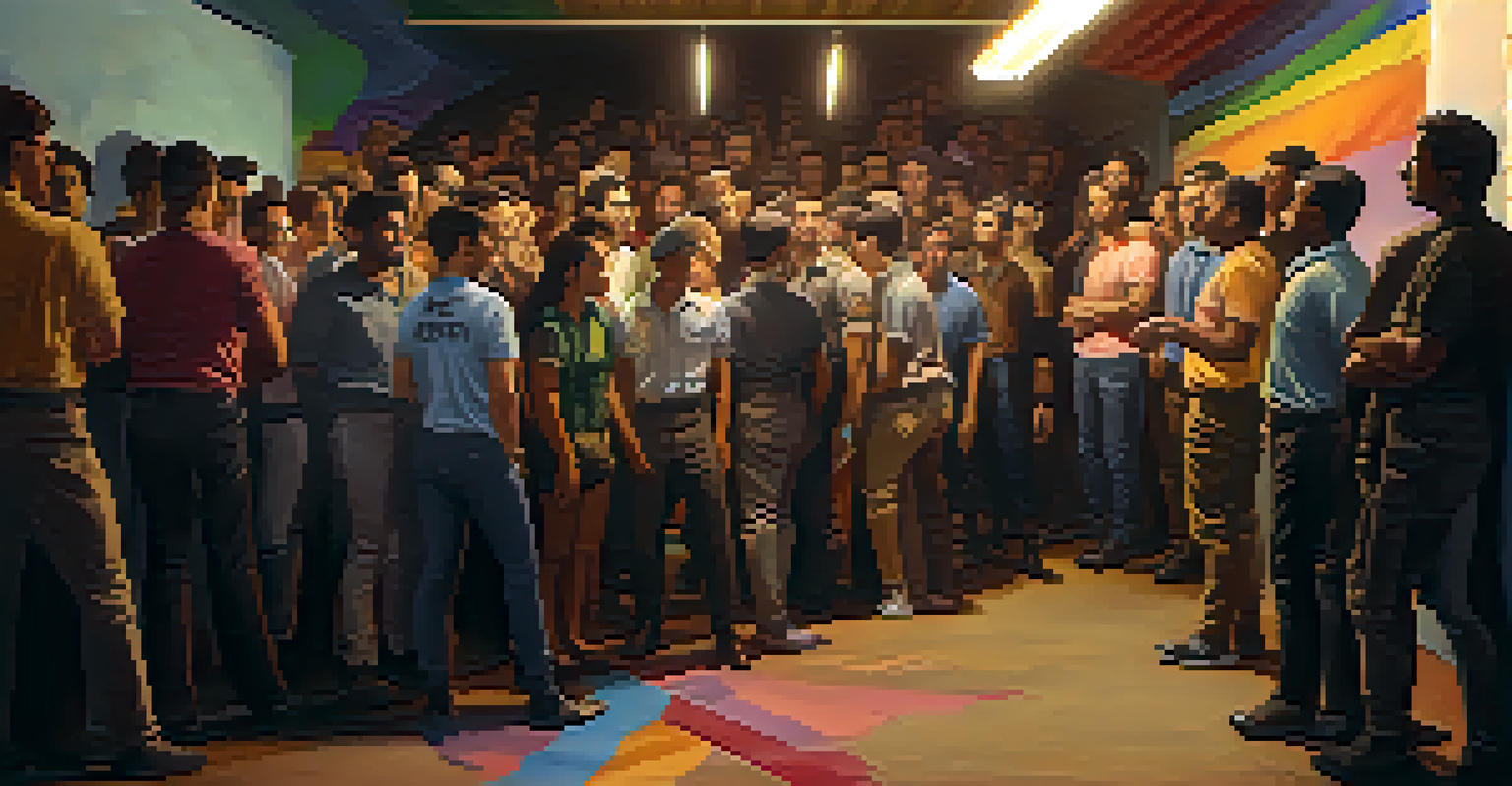The Historical Significance of LGBTQ+ Rights in Brazil

Early Struggles: LGBTQ+ Existence in Brazil's Colonial Era
The history of LGBTQ+ rights in Brazil can be traced back to its colonial era, where same-sex relationships were often overlooked yet existed. During this time, societal norms were heavily influenced by Portuguese colonial rule, which brought both repression and a complex interplay of sexual identities. Despite the lack of formal recognition, individuals engaged in same-sex relationships, indicating that LGBTQ+ existence was not entirely invisible.
The history of LGBT rights in Brazil is a testament to the resilience and courage of those who have fought for their place in society.
As Brazil transitioned into the 19th century, the influence of European ideologies began to reshape societal attitudes towards sexuality. This era saw the emergence of the first legal frameworks, albeit discriminatory, which reflected the growing tension between traditional values and evolving social identities. Although homosexuality was criminalized, many LGBTQ+ individuals sought community and solidarity amidst societal challenges.
These early struggles laid the groundwork for future advocacy and resistance movements. The resilience of the LGBTQ+ community during this period was crucial, illustrating that the fight for rights would not be easily quelled. Understanding this history is essential to appreciate the subsequent developments in the LGBTQ+ rights movement in Brazil.
The Dictatorship Era: Repression and Resistance
The military dictatorship in Brazil, which lasted from 1964 to 1985, marked a dark chapter for LGBTQ+ rights. The regime's oppressive tactics included censorship and persecution of marginalized groups, particularly targeting those who deviated from traditional gender and sexual norms. This environment of fear pushed many LGBTQ+ individuals into hiding, but it also sparked a fierce desire for change.

Amidst the repression, underground movements began to form, creating networks of support and advocacy. Activists organized clandestine gatherings to discuss issues related to sexual identity and rights, fostering solidarity among the community. These efforts were essential in raising awareness and laying the foundation for future activism.
LGBTQ+ Rights Evolve Over Centuries
The history of LGBTQ+ rights in Brazil reveals a journey from colonial repression to modern legal recognition.
The resistance during this period was not without cost; many faced violence and persecution. However, the courage displayed by these activists was instrumental in igniting the fire of the LGBTQ+ rights movement in Brazil, leading to a greater push for recognition and equality in the following decades.
The Rise of LGBTQ+ Activism in the 1980s and 1990s
With the end of the dictatorship in the mid-1980s, Brazil experienced a surge of political and social movements, including a revitalized LGBTQ+ rights movement. Activists began to vocalize their demands for equality, visibility, and protection against discrimination. This period marked a significant shift, as LGBTQ+ issues started to gain more attention within the broader human rights discourse.
In the face of adversity, the LGBTQ+ community in Brazil has consistently demonstrated strength and solidarity.
The emergence of AIDS in the 1980s played a crucial role in mobilizing the LGBTQ+ community. Organizations formed to provide support, education, and advocacy, highlighting the need for healthcare and social services that specifically addressed the needs of LGBTQ+ individuals. This crisis not only galvanized activism but also fostered a sense of community and urgency around the rights of sexual minorities.
As LGBTQ+ groups gained momentum, they began to influence public opinion and political agendas. The visibility of LGBTQ+ individuals in media and politics increased, challenging stereotypes and stigmas that had long persisted. This era set the stage for significant legal advancements in the years that followed.
Legal Milestones: Landmark Changes in LGBTQ+ Rights
The 2000s marked a pivotal period for LGBTQ+ rights in Brazil, with several significant legal milestones achieved. In 2004, the Brazilian government recognized same-sex partnerships, allowing for some legal protections previously denied to LGBTQ+ individuals. This recognition was a monumental step towards equality, reflecting a gradual shift in societal attitudes.
In 2013, Brazil's Supreme Court ruled in favor of same-sex marriage, solidifying the rights of LGBTQ+ couples to marry legally. This landmark decision not only granted legal benefits but also served as a beacon of hope for activists and allies across the country. The ruling underscored Brazil's commitment to human rights, despite ongoing societal challenges.
Pride Parades Boost LGBTQ+ Visibility
Pride parades in Brazil serve as powerful symbols of identity and rights, fostering acceptance and solidarity within the community.
These legal changes have been instrumental in improving the lives of countless LGBTQ+ individuals, providing them with the recognition and protections they deserve. However, the struggle for full equality continues, as advocates push for comprehensive anti-discrimination laws and protections against violence.
The Role of Pride Parades in Promoting Visibility
Pride parades have become iconic events in Brazil, serving as powerful symbols of LGBTQ+ visibility and pride. The first São Paulo Pride Parade took place in 1997 and has since grown to become one of the largest in the world, attracting millions of participants each year. These celebrations are not just about festivity; they represent a collective assertion of identity and rights.
Through vibrant displays of culture and community, Pride parades have raised awareness about LGBTQ+ issues while also fostering acceptance and solidarity. They provide a platform for activists to voice their demands and highlight the ongoing challenges faced by the LGBTQ+ community. The parades have become a crucial part of the national landscape, influencing public perceptions of LGBTQ+ rights.
Moreover, the international attention garnered by these events has positioned Brazil as a leader in the global LGBTQ+ rights movement. The visibility created by Pride parades has not only empowered local communities but has also sparked dialogue and change across borders, illustrating the interconnectedness of the struggle for equality.
Challenges Ahead: Violence and Discrimination Persist
Despite significant progress in LGBTQ+ rights, Brazil still grapples with alarming levels of violence and discrimination against sexual minorities. Reports indicate that Brazil has one of the highest rates of violence against LGBTQ+ individuals in the world, particularly affecting transgender women. These stark realities highlight the ongoing challenges that the community faces, even in the face of legal advancements.
Discrimination remains pervasive in various aspects of life, including employment, healthcare, and education. Many LGBTQ+ individuals continue to experience stigma and exclusion, which can lead to mental health struggles and social isolation. This underscores the need for comprehensive policies that address not just legal recognition but also the societal attitudes that perpetuate discrimination.
Ongoing Violence and Discrimination
Despite advancements, Brazil faces significant challenges with violence and discrimination against LGBTQ+ individuals, highlighting the need for continued advocacy.
Activists and allies are working tirelessly to combat these issues, advocating for better protections and support systems. The fight for LGBTQ+ rights in Brazil is far from over, and it requires a collective effort to ensure that all individuals can live freely and authentically without fear of violence or discrimination.
The Future of LGBTQ+ Rights in Brazil: Hope and Resilience
Looking ahead, the future of LGBTQ+ rights in Brazil is a mix of hope and determination. The resilience of the LGBTQ+ community, coupled with increased awareness and advocacy, suggests that progress is possible. As more allies join the fight for equality, the movement continues to gain momentum, inspiring future generations to stand up for their rights.
Education plays a crucial role in shaping public perceptions and fostering acceptance. Initiatives aimed at increasing LGBTQ+ visibility in schools and communities can help dismantle stereotypes and promote understanding. By nurturing a culture of inclusivity, Brazil can move closer to a society where everyone, regardless of their sexual orientation or gender identity, is treated with dignity and respect.

Ultimately, the journey toward full equality is ongoing, but the strides made thus far serve as a testament to the power of collective action. As Brazil navigates this complex landscape, the continued commitment to advocacy and support for LGBTQ+ rights will be instrumental in shaping a brighter, more inclusive future.